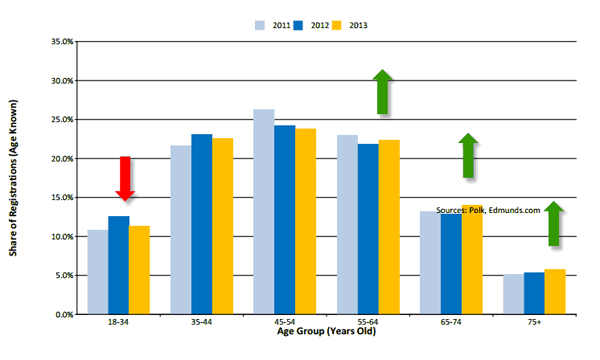For a few years now many commentators have forwarded a theory about millennials and cars. Supposedly the American romance between young people and cars just wasn’t there anymore. Young people were in no hurry to buy cars, just as they were also pushing off marriage and home ownership.
But what if that’s not it at all, and it’s really all about the economy? Edmunds.com just published a very interesting story that crunched the latest new car registration numbers by age demographic. From 2007-2011, car purchases by 18 to 34 year olds plummeted 30 percent. Then they increased substantially in 2012, but are down again this year almost to 2011 levels.
So what’s up? In 2012 it appeared the worst of the Great Recession was behind us, but growth slowed this year. Growth was also uneven, benefiting on average older Americans with stock and property more than Millennials. This so-called wealth effect plays a big role in supporting new car sales.
Even more tellingly, the kind of car Millennials do buy also refutes the love lost theory. Millennials typically aren’t buying econoboxes for simple transportation. In every income bracket save $150K +, Millennials buy a similar percentage of luxury and sport vehicles as other age brackets.
Of course there are Millennials living in urban settings who don’t want or need cars. The larger issue is whether sluggish growth and the economic divide in this country are increasingly making a new car purchase an economic impossibility for many Millennials who do want them. The Post published a good story today on “Super Zips,” zip codes with median income and education levels in the 95th percentile nationally.
By and large those Millennials should do OK and eventually purchase a new car. For the rest, I’d say the picture is far less clear. They want cars, they just can’t afford them.
That’s the issue that needs to be focused on. The harder a new car purchase is for the average young American, the worse the future looks for the car industry in this country.
UPDATE: Deloitte study finds money, not idealogy, is why Millennials aren’t buying cars.

Some additional elements to be factored in this equation are as the Millennials age, marry & have children they will be leaving their hip urban environments for homes with yards in subdivisions near good schools requiring them to purchase their SUV’s. Most suburban lifestyles, even with a decent public transportation infrastructure requires households have at least one vehicle, more than likely two.
A bigger concern to the automobile manufactures is the mainstream acceptance of car sharing and the eventual advent of the intellegent transportation system / connected car. It may take 50 – 60 years , however technology is in very early infancy stages of creating a major transformation of the entire land transportation system as we know it today, not unlike the early 1900’s when we went from horse and buggies to internal combustion engine propelled vehicles. Most auto collision repair centers will disappear and the auto dealerships will dwindle in number with the limited number in existence being Car Share Distribution & Maintenance Centers. Todays’ Gates, Jobs & Zuckerberg will be like yesteryears’ Marconi, Ford, and Nikola Tesla.